Student Union
- By Paul Ross
US Begins Collecting Immigrants' Social Media Info
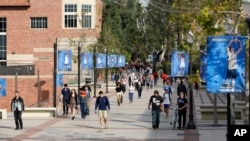
The U.S. Department of Homeland Security (DHS) begins collecting “social media handles, aliases, associated identifiable information and search results” from all immigrants seeking to enter the U.S. Wednesday.
While the measure was announced in late September, DHS has been tight-lipped about how it will collect the data and who will scrutinize it.
The sweeping practice broadens earlier efforts under President Barack Obama.
“This amendment does not represent a new policy,” said DHS spokesperson Joanne Talbot. “DHS, in its law-enforcement and immigration-process capacity, has and continues to monitor publicly available social media to protect the homeland.”
The new policy is an amendment to the 1974 Privacy Act. It includes monitoring of green card holders and naturalized citizens as well as relatives of immigrants, doctors who treat immigrants, law enforcement officials who certify an immigrant's cooperation in an investigation, and attorneys and others who assist immigrants.
Seamus Hughes, deputy director of the Program on Extremism at George Washington University in Washington, questioned the practicality of reviewing so many accounts on social media.
“Purely from a practical standpoint, I don’t see how DHS has the resources to implement this,” he shared on Twitter.
Despite the logistical challenges, some U.S. lawmakers have been pushing the government for years to do more to monitor publicly available information about people coming into the country.
In 2015, after attackers carried out a mass shooting in San Bernadino, California, Republican Senator John McCain introduced a bill requiring DHS to search social media websites of prospective foreign travelers and immigrants. At the time he said, "it is critical that we have the strongest policies and procedures in place for background checks that reflect the evolving security threats facing our nation."
Changes to Privacy Act
The Privacy Act was introduced in 1974 after President Richard M. Nixon resigned when it was revealed he broke into files of the Democratic Party at the Watergate Hotel in Washington, D.C. The measure was designed to curb the government's ability to gather information on individuals.
It establishes, “a code of fair information practices that governs the collection, maintenance, use, and dissemination of information about individuals that is maintained in systems of records by federal agencies,” according to the Department of Justice.
“I can’t think of any situations where this monitoring and record-collection has been used in an abusive way,” said Major General Charles J. Dunlap Jr., who retired from the Air Force in 2010.
“But if it were, that would need to be immediately addressed and rectified,” said Dunlap, who is also a law professor and executive director of the Center on Law, Ethics, and National Security at Duke University in Durham, N.C. “I don’t think this will have much effect on international students studying in the U.S.”
“I do think that DHS is to be commended by trying to be more transparent about what they are doing,” he said.
Worries over government monitoring
The majority of social media users are at or around college age, according to the Pew Research Center: 86 percent of people ages 18-29 use at least one social media site, compared with 80 percent of those between the ages of 30-49, and 64 percent in the 50-64 demographic, and 34 percent among seniors aged 65 and older.
“In a way I feel that this is terrifying, because now, a part of our privacy is being violated,” said Erick Cortez, a student and permanent resident from the University of Arkansas. Cortez is studying broadcasting and political science.
Originally from El Salvador, he said he is anxious and worried about what he posts on social media.
“Many people like myself use social media to follow and be surrounded by others that share a similar opinion,” he said. “But now that they [DHS] will be monitoring our social media accounts, I feel like my freedom if speech is being revoked and I won't be able to express how I feel.”
Michael Manansala, who grew up in Minnesota and came to the U.S. from the Philippines 18 years ago, said DHS is overstepping its boundaries.
“As a naturalized citizen, I'm extremely uncomfortable with USCIS and DHS invading my privacy through the collection of my social media information and search results without a warrant or my consent,” wrote Manansala in one of thousands of comments on the Federal Register.
“I think the DHS serves a vital function in preserving our national security,” said Manansala. “That being said … I’m just as American as a natural-born citizen. As Americans, we are owed equal protection and treatment under the law.”
Please share your suggestion in the Comments here, and visit us on Facebook, Twitter, Instagram and LinkedIn.
See all News Updates of the Day
Tips for staying safe while studying in the US
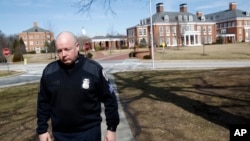
Recent news events have raised safety concerns among some international students studying in the United States.
Adarsh Khandelwal, writing in the India Times, has tips for staying safe from the moment you arrive until the day you complete your studies. (March 2024)
Some colleges are making digital literacy classes mandatory

A 2019 study by Stanford found that most college students can’t tell the difference between real and fake news articles. Amid rampant online disinformation, and the threat of AI-generated images, some schools are making students learn “digital literacy” to graduate.
Lauren Coffeey reports for Inside Higher Ed. (March 2024)
With federal student aid delays, students aren’t sure what college will cost
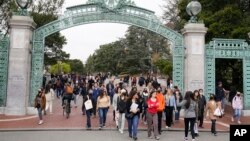
The U.S. Department of Education’s federal student aid form (FAFSA) experienced serious glitches and delays this year.
Now, many students have been admitted to college, but don’t know how much money they’ll need to attend.
Read the story from Susan Svrluga and Danielle Douglas-Gabriel for The Washington Post. (March 2024)
Senator draws attention to universities that haven’t returned remains
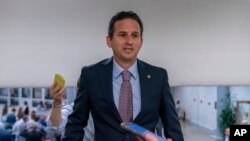
More than 70 U.S. universities continue to hold human remains taken from Native American burial sites, although those remains were supposed to be returned 30 years ago.
Jennifer Bendery writes in Huffington Post that one senator has been using his position in an attempt to shame universities into returning remains and artifacts. (April 2024)
COVID forced one international student to go hungry
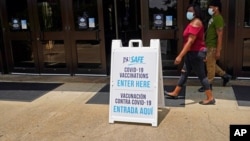
When Samantha (not her real name) enrolled in community college in the U.S., her family at home in South Africa scrimped and saved to support her.
But the COVID-19 pandemic hurt the family’s finances, and at one point Samantha had four on-campus jobs just to make ends meet. Many in the U.S. believe international students are wealthy sources of funding for universities, but stories like Samantha’s suggest otherwise.
Andrea Gutierrez reports for The World. (March 2024)






